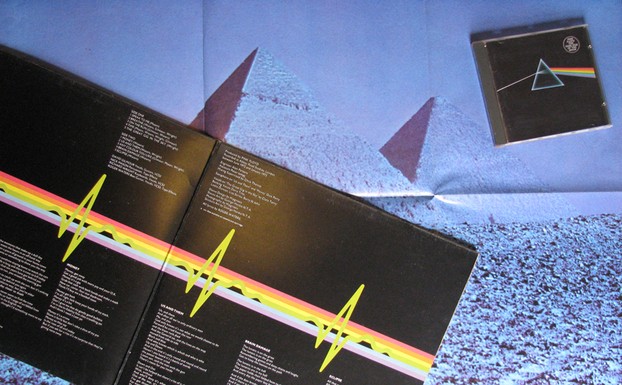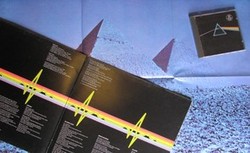Pink Floyd's Dark Side of the Moon album changed rock music for ever. This was a concept album that raised the bar for all concept albums. It told of time, money and even mental illness. It captured a life time in a single album. Released in 1973, now decades later its message seems as fresh and relevant as it did then.

Pink Floyd’s Dark Side of the Moon: A Track by Track Guide
A look back at the iconic 1973 album Dark Side of the Moon by Pink Floyd
 Dark Side of the Moon by Pink Floyd |
When Pink Floyd released the album Dark Side of the Moon in 1973, the music world was changed forever. Other bands had experimented with concept albums but Pink Floyd elevated the idea to a new art form. Those who have never listened to it are lucky because they can still experience the jaw dropping that accompanies hearing it for the first time. For the teenagers of the 1970s, that first listen was up there with losing their virginity as the most memorable experience of their youth; if pushed to be honest, Dark Side of the Moon would probably take top spot.
From a commercial point of view, top spot is what it did take, hitting number one in the charts in Canada, New Zealand and the USA but almost more importantly staying in the charts not for weeks but for years. The album was in the Billboard charts for a record 741 weeks covering the fifteen years from 1973 to 1988. It was one of the top selling albums of the 1970s, and some 45 million copies have been sold. Though it has tracks, it is best listened to as an album, from start to finish, but here is a look at the ten tracks.
Speak to Me
The instrumental opener was written by drummer Nick Mason. It starts with a heart beat slowly getting louder and in the background is laughter and the faint sound of someone talking about being mad. It builds up through various sound effects that are heard later in the album to a musical climax, which is the opening of the next track.
Breathe
David Gilmour and Richard Wright composed this track using Roger Waters’ lyrics. This track deals with the concept of time but not in the same way as the later track “Time”. This track is about living for the moment, enjoying what is here and now.
On the Run
This is another instrumental and an airport public address announcement can be heard in the background. There is a sound of running and the common theory is that the theme for this track is travel, though without lyrics that is mostly speculation. This was also written by David Gilmour and Richard Wright.
Time
Written by Nick Mason, Roger Waters, David Gilmour and Richard Wright, this is one of the two best known tracks (“Money” is the other) on the album and tells a story familiar to many of how life gets away from you, how the plans of youth never materialise as time passes more quickly than you thought. It opens with a mixture of alarm clocks and chimes followed by a fast ticking sound leading into the music. Perhaps the most telling line is: “And then one day you find ten years have got behind you, no one told you when to run, you missed the starting gun.” And it finishes in similar fashion with: “The time is gone the song is over, thought I’d something more to say.” The song is followed on the same track with a reprise of “Breathe”.
The Great Gig in the Sky
Written by Richard Wright, this is mostly an instrumental though again spoken parts can be heard in the background around the theme of dying. This is reinforced by Clare Torry’s haunting vocal instrumentals. After winning a court case, later versions of the album jointly credit Clare Torry as one of the writers of the track.
Money
The opening track to the second side of the album starts with the sound of cash registers and coins jingling. This song is a blatant attack on the money culture where everything is about getting rich but when it comes to sharing it the idea is an anathema to those who hold the money. The overt left-wing lyrics helped pull in the student audience in the 1970s. It was written by Roger Waters.
Us and Them
The left-wing theme continued with this track, also written by Roger Waters with help from Richard Wright. It looks at the two sides of society from a military view with the general controlling a war but it being the ordinary soldiers who pay the cost with their lives and then reflects this onto peace time society where the poor can still die from hunger while the rich do not care: “Out of my way, it’s a busy day, I’ve got things on my mind. For want of the price of tea and a slice, the old man died.”
Any Colour You Like
Another instrumental, this time written by Nick Mason, David Gilmour and Richard Wright. This is about a lack of choice in society and the title comes from a street seller that Roger Waters heard. His patter included the line: “Any colour you like, they’re all blue.” This in itself though was a version of Henry Ford’s famous line about the Model T: “You can have it any colour you like, as long as it's black."
Brain Damage
This is about mental illness, and writer Roger Waters has said that it was a tribute to former Pink Floyd member Syd Barrett who suffered from schizophrenia and manic depression. The line “I’ll see you on the dark side of the moon” is Waters saying to Barrett that they are both the same, the dark side of the moon being the insane side of everybody.
Eclipse
Roger Waters also wrote the final track on the album, which runs on from “Brain Damage” and rounds off the album with a list of everything that is done during a life and how the moon eclipses the lot. All of life is really the dark side. A chilling conclusion to a chilling and brilliant album.
Dark Side of the Moon Conclusion
The album cover showing a beam of light reflected through a prism with no title or band name became one of the iconic images of the 1970s and fitted well with an album that became iconic in its own right. It tells the story of life, though the concepts of time, money and mental illness. There has never been another album like it, and there probably never will.
You might also like
Beethoven: The Genius Who Composed The Moonlight SonataLudwig van Beethoven is probably the best known composer of classical music. ...
Ground Control to David Bowie: You Made Everything Look DifferentActor, musician and painter David Bowie, who passed away on January 10, 2016,...






 KZine Issue 31: Review of October 2021 Issueon 11/07/2021
KZine Issue 31: Review of October 2021 Issueon 11/07/2021
 KZine Issue 30: Review of June 2021 Issueon 07/05/2021
KZine Issue 30: Review of June 2021 Issueon 07/05/2021
 KZine Issue 29: Review of February 2021 Issueon 02/23/2021
KZine Issue 29: Review of February 2021 Issueon 02/23/2021
 KZine Issue 28: Review of September 2020 Issueon 10/01/2020
KZine Issue 28: Review of September 2020 Issueon 10/01/2020



Comments
SteveRogerson, Thank you for practical information, pretty pictures and product lines.
In particular, I appreciate your concise approach to each track so that it's impossible not to comprehend what lyrics and music communicate.
Do we know what products the street seller that Roger Waters heard saying "Any colour you like, they’re all blue" was promoting?